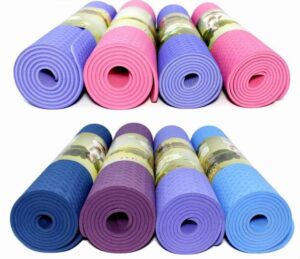How to Create a Sustainable and Healthy Lifestyle

How to Create a Sustainable and Healthy Lifestyle
In today’s fast-paced world, many are striving to lead a life that promotes personal well-being while being mindful of the environment.
Achieving a sustainable and healthy lifestyle involves making choices that positively impact your body, mind, and the planet. This lifestyle encourages balance, reduces stress, and fosters long-term happiness and health. In this article, we’ll explore practical ways to create such a lifestyle, focusing on simple, actionable steps that anyone can adopt.
1. Adopt a Balanced Diet
A balanced diet is crucial for both personal health and sustainability. Consuming whole, natural foods like fruits, vegetables, grains, and lean proteins not only nourishes your body but also lowers your carbon footprint. Processed foods and heavy meat consumption contribute to environmental degradation and health issues, so switching to a more plant-based diet can be a great start.
Tips for a Sustainable Diet:
- Choose seasonal and local produce: Buying locally grown food supports the local economy and reduces the environmental impact caused by long-distance transportation.
- Minimize meat consumption: Opt for plant-based proteins such as beans, lentils, and tofu. Reducing red meat consumption can significantly lower greenhouse gas emissions.
- Avoid processed foods: Focus on whole foods that are less packaged and processed to reduce waste and enhance your health.
2. Exercise Regularly
Physical activity is essential for maintaining both physical and mental health. Regular exercise helps keep your body fit, reduces stress, and promotes better sleep. Importantly, being active doesn’t have to mean long, strenuous workouts at the gym. Simple activities like walking, cycling, or yoga can be just as effective and easier to sustain over time.
Ways to Incorporate Exercise:
- Choose enjoyable activities: Whether it’s walking, dancing, or swimming, picking an activity you enjoy increases the likelihood of consistency.
- Walk or bike instead of driving: Not only does this keep you active, but it also reduces your carbon footprint.
- Include strength training: Strength training builds muscle, supports joint health, and boosts your metabolism.
3. Prioritize Mental Health
Mental health plays a significant role in creating a sustainable lifestyle. Stress, anxiety, and depression can all take a toll on both your physical and emotional well-being. Incorporating mindfulness practices such as meditation, deep breathing exercises, and spending time in nature can help you stay mentally balanced.
Ways to Boost Mental Health:
- Practice mindfulness or meditation: Mindfulness techniques like deep breathing and meditation can help reduce stress and promote emotional stability.
- Reduce screen time: Excessive screen time, especially on social media, can negatively impact mental health. Limit your time online and focus on real-world experiences.
- Spend time outdoors: Studies have shown that exposure to nature improves mood, reduces stress, and enhances overall mental well-being.
4. Reduce Waste and Live Green
Living sustainably means minimizing your waste and adopting eco-friendly habits. Waste reduction plays a major role in protecting the planet from pollution and resource depletion. By making small, conscious efforts, you can help minimize your environmental impact.
Tips to Reduce Waste:
- Use reusable bags, bottles, and containers: Replace single-use plastics with durable, reusable alternatives to cut down on waste.
- Recycle and compost: Sorting your waste can significantly reduce the amount of trash going to landfills, helping to conserve natural resources.
- Conserve energy and water: Use energy-efficient appliances, take shorter showers, and turn off lights when not in use to reduce your household’s environmental footprint.
5. Get Enough Sleep
Sleep is vital for overall health. Adults need 7 to 9 hours of quality sleep each night to function optimally. Chronic sleep deprivation can lead to serious health issues, including heart disease, obesity, and weakened immune systems.
Tips for Better Sleep:
- Establish a consistent sleep routine: Go to bed and wake up at the same time every day to regulate your body’s internal clock.
- Create a relaxing sleep environment: Keep your bedroom cool, quiet, and free from distractions like electronic devices.
- Avoid stimulants before bed: Caffeine and heavy meals can interfere with your ability to fall asleep.
6. Foster Positive Relationships
Meaningful relationships with family, friends, and community members are crucial for emotional well-being. Social connections help reduce stress, boost self-esteem, and provide a sense of purpose. Engaging in activities with others can bring joy and support long-term happiness.
Ways to Cultivate Positive Relationships:
- Communicate openly: Foster strong communication skills to strengthen your bonds with others.
- Spend quality time with loved ones: Make time for family and friends, even during busy times, to maintain healthy relationships.
- Engage in community activities: Volunteer, attend local events, or join groups that share your interests to create a sense of belonging.
7. Simplify and Declutter
A cluttered space can lead to a cluttered mind. Simplifying your life by reducing physical and mental clutter can bring a sense of peace and enhance productivity. Minimalism focuses on keeping only what you need, allowing you to focus on what truly matters.
Steps to Simplify:
- Declutter your space: Donate or recycle items you no longer need. A clean, organized space can help reduce stress and improve focus.
- Embrace minimalism: Focus on experiences rather than material possessions. Buy only what is necessary and of high quality.
- Practice digital detox: Reduce unnecessary digital clutter by limiting your time on electronic devices and social media.
8. Practice Gratitude
Gratitude is a simple yet powerful tool that can enhance your mental well-being and outlook on life. Practicing gratitude shifts your focus from what you lack to what you already have, fostering a positive mindset.
Ways to Incorporate Gratitude:
- Keep a gratitude journal: Write down things you are thankful for each day to help shift your perspective to a more positive one.
- Express appreciation to others: Simple gestures like thanking someone or acknowledging their efforts can enhance your relationships.
- Reflect on the positives: Regularly take time to think about what is going well in your life, especially during challenging times.
FAQs
1. How can I make my diet more sustainable?
- To make your diet more sustainable, reduce meat consumption, focus on plant-based foods, and opt for local and seasonal produce.
2. Why is exercise important for a sustainable lifestyle?
- Exercise is essential for maintaining physical and mental health, reducing stress, and promoting long-term well-being, all of which contribute to a sustainable lifestyle.
3. How can I reduce waste at home?
- Reduce waste by using reusable items, recycling, composting, and conserving water and energy with eco-friendly practices.
4. How much sleep do adults need for good health?
- Adults typically need 7 to 9 hours of sleep each night to support overall health, mood, and productivity.
5. Why is mental health important in a sustainable lifestyle?
- Mental health is key to overall well-being, and practices like mindfulness, meditation, and spending time in nature can improve emotional health and reduce stress.
Conclusion
Creating a sustainable and healthy lifestyle is not about making drastic changes overnight but rather focusing on small, consistent improvements. By adopting a balanced diet, exercising regularly, prioritizing mental health, reducing waste, and fostering positive relationships, you can cultivate a lifestyle that benefits both your well-being and the environment. Start with simple steps, and gradually build habits that support long-term health and sustainability.






